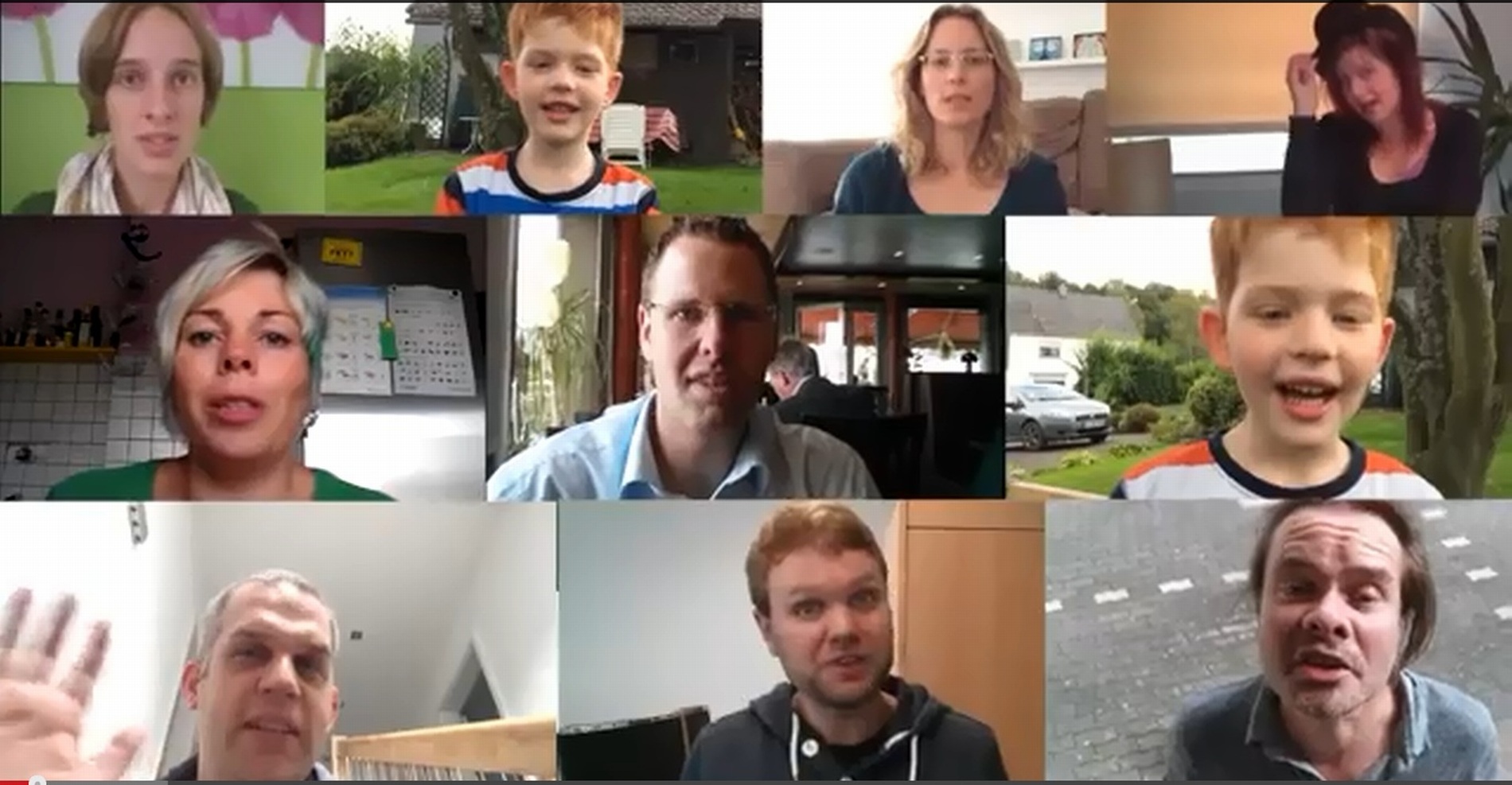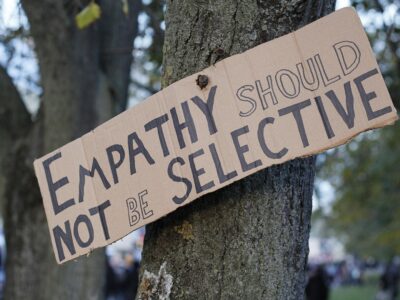
Sequence from the video “German for Refugees”.
When refugees arrive in Germany, they are housed for a short period of time in what is known as a reception centre, or Erstaufnahmeeinrichtung, until it is decided where they will live long term and where their application for asylum will be decided. The reception centres don't provide German language courses — refugees may only attend courses once authorities have granted them permission to remain in the country.
To make sure they feel welcome and have something to do during their stay there, a new project is crowdsourcing videos of people speaking phrases in German to teach refugees the basics of the language.
#heimkino, which means home cinema, is led by Julia Dombrowski and Markus Möller in Siegen, central Germany. It was showcased on the blog Wie kann ich helfen? (How can I help?), which highlights a number of projects and initiatives people can volunteer for.
Dombrowski, a copywriter and blogger, describes her experiences at the centre in detail on her blog. At the very first German course, which was attended by only a few participants due to low awareness of it, she found herself overcome by a slew of emotions. She writes:
Ich brauche mehr Distanz. An diesem ersten Tag haben mich so viele Eindrücke bewegt, dass ich mich zeitweise geradezu gelähmt gefühlt habe. Das ist nicht produktiv und führt zu einer wehleidigen Abwärtsspirale. Da war zum Beispiel dieser Moment, in dem mir klar wurde: Wenn diese zauberhaften Kinder, die man so leicht ins Herz schließen kann, nicht hier wären – dann wären sie jetzt in Syrien. In Syrien, wo Bomben fallen und Fanatiker unbeteiligte Menschen abschlachten. Das war ein Augenblick, in dem ich fast aus der Rolle gefallen wäre. Und das hilft niemandem. Rührseligkeit hilft einfach nicht.
I need more distance. On the first day I was emotionally affected by so many of the impressions I gained that at times, I felt almost paralysed by it. That's not productive, and it leads to a miserable downward spiral. For example, there was a point at which I realised: If these enchanting little kids who are so easy to emotionally connect with weren't here – they'd be in Syria right now. In Syria, where there are bombs falling and fanatics are slaughtering innocent people. That was a moment when I nearly fell out of character. And that doesn't help anyone. Sentimentality just won't help.
By the second week, the little room was filled with over 100 people. This made teaching a language course impossible. Dombrowski and Möller, who assisted her, had to find a solution whereby as many people as possible could learn a little German. They decided on “edutainment”.
Hatten sich den August über nicht jede Menge Menschen für die gute Sache weltweit freiwillig Eiswasser über den Kopf geschüttet (#IceBucketChallenge) und sich dabei gefilmt, weil neben der Spendenaktion für ALS eine Videoaktion mit kleinen Mitteln auch einfach Spaß macht? Könnten wir das nicht irgendwie für uns nutzen? Nutzen, dass wir viele hilfsbereite Menschen kennen, die uns Videoschnipsel schicken könnten (ganz simpel gemacht, mit der Smartphone-Kamera oder der Webcam) und wesentliche Phrasen für uns einsprechen: “Guten Tag”, “Ich heiße …”, “Bitte”, “Danke” die Zahlen von 1 bis 10 und eine Verabschiedung?
Back in August, didn't a whole load of people worldwide voluntarily throw ice water over their heads for a good cause (#IceBucketChallenge) and film themselves doing it? Because alongside collecting donations for ALS, a video campaign is also something that's good fun, even with limited equipment available. Couldn't we somehow use that for us? Use the fact that we know so many helpful people who could send us a video clip, (recorded really easily with a smartphone camera or webcam) and say essential phrases for us like “Guten Tag”, “Ich heiße …”, “Bitte”, “Danke”, the numbers from 1 to 10 and how to say goodbye?
Dombrowski and Möller called on people via social networks to send in mobile video clips. Plenty of people responded, and the first #heimkino video was born:
The videos were shown during the German course, and the students of German repeated the words and phrases in unison. But it's not only the refugees who learn something from this process: the teachers, too, experience totally new things. Möller got to know a refugee who told him about his flight from Syria, and put down his thoughts about the encounter on Dombrowski's blog:
Ich verstehe, als ich Bilder von Panzern sehe, die durch die Straßen rollen, dass ich nicht verstehen kann.
…
Ich fange an zu überlegen, ob ich 9.000 Euro für eine Flucht zusammenbekommen könnte. Bekomme ich 36.000 Euro für die komplette Familie zusammen? Und sind 9.000 Euro für syrische Verhältnisse nicht viel mehr als für uns?
Wie viel Kohle könnte ich für mein Überleben zusammenkratzen. Zwanzigtausend? Fünfzigtausend? Hunderttausend? Und wie schaffe ich es, dies so geheim zu tun, damit niemand erfährt, dass ich desertieren möchte? Das Auto könnte ich verkaufen. Es würde aber nicht viel bringen. Das Haus vielleicht. Das bräuchte ich ja nicht mehr. Wie viel bekommt man wohl für ein Haus in einem Kriegsgebiet? Wie viel, wenn es zerbombt ist?
Ich merke, dass meine Vorstellungskraft für solche Überlegungen nicht ausreicht.
I understand when I see pictures of tanks rolling through the streets that I can't possibly understand.
…
I began to wonder if I could get together €9000 for a flight. Could I get together €36,000 for the whole family? And isn't €9,000 not so much more, in Syrian terms, than it is for us?
How much could I scrape together for my survival? Twenty thousand? Fifty thousand? One hundred thousand? And how would I manage to do it so secretly, so that nobody would know I wanted to desert? I could sell the car, but it wouldn't fetch very much. The house, maybe. I suppose I wouldn't need that anymore anyway. How much would you get for a house in a war zone? How much would you get if it's bombed out?
I realise that my powers of imagination don't stretch far enough for these considerations.
Dombrowski and Möller uploaded the videos to YouTube so that others could use them as well as to show that it's easy, even with just a little effort, to support refugees and welcome them to Germany.
Here's the second #heimkino video:
Kaddour from Syria had to leave his home quickly and was grateful. He thought a little Arabic course for the German teachers wouldn't go amiss:
After each course, refugees request dictionaries so that they can continue to learn independently. For this reason, Dombrowski uses her blog and social networking accounts to request donated dictionaries while at the same time asking for friendly gestures of welcome. She suggests that people leave a greeting for the refugees in the book.







2 comments